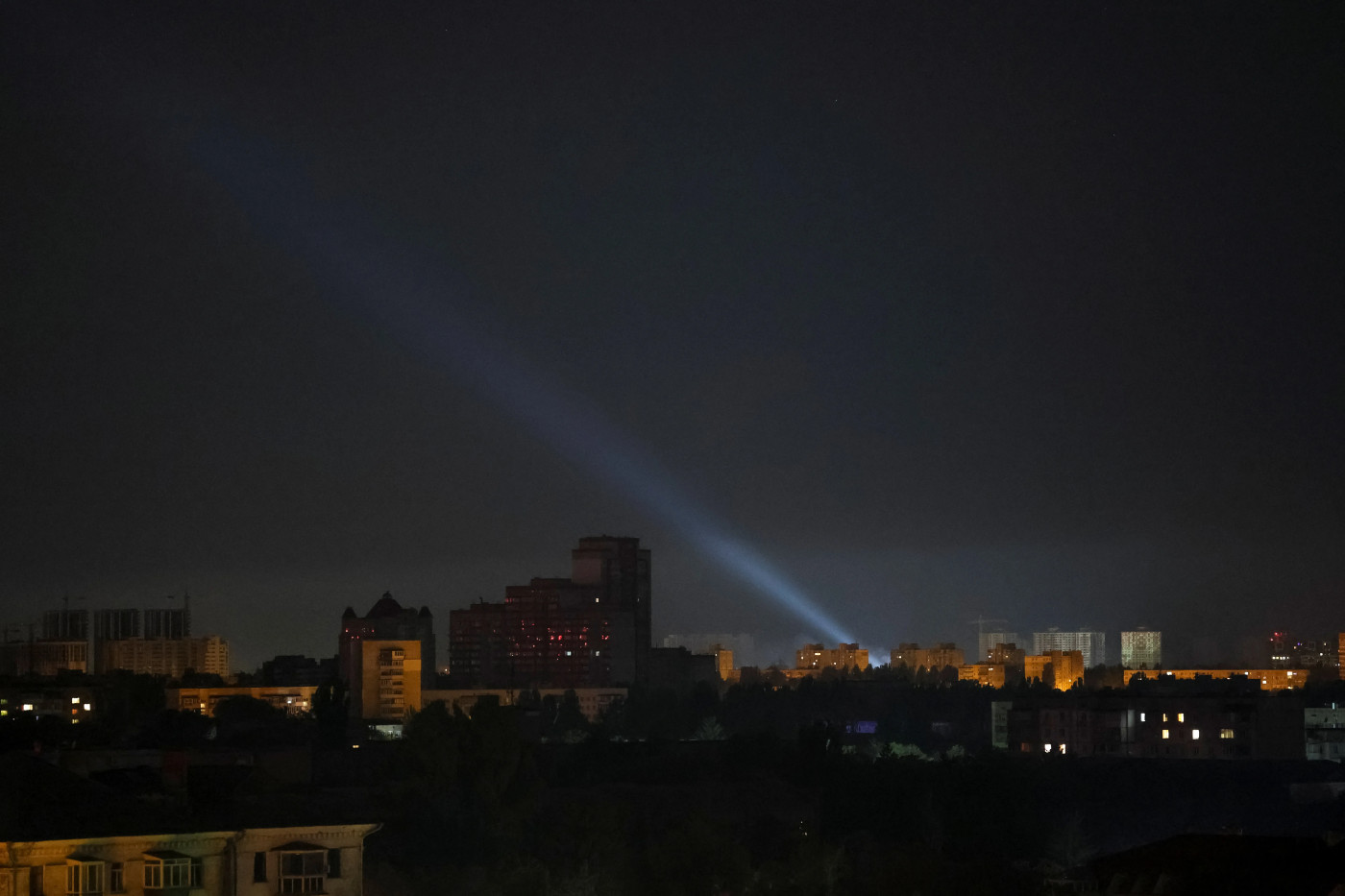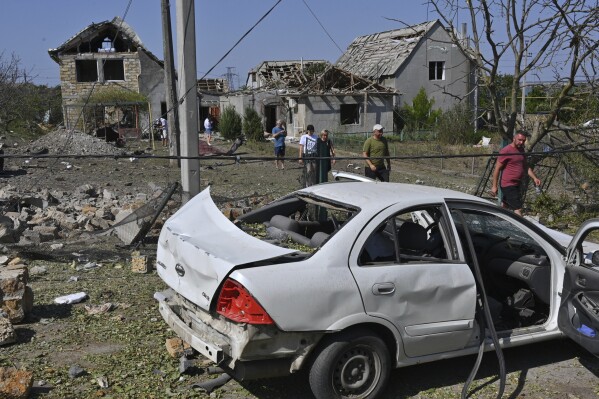The Country that NATO and the West are Losing to Russia
Across the country of Georgia, the gold-starred blue flags of the European Union fly above everything from government ministries to tiny local police stations and seem almost as ubiquitous as the red and white national flag with its cross of St. George.
But despite the enduring pro-Western symbolism and overwhelming popular support for joining the EU and NATO, it is President Vladimir Putin's Russia that is in the ascendant as the Georgian government's relationship with the United States and other Western powers goes downhill fast. While Western countries have trumpeted the way Russia's war in Ukraine has strengthened solidarity and brought both Finland and Sweden into the NATO camp, once-aspiring member Georgia appears headed in the other direction.
Georgia's population of 3.7 million is only one-third that of its namesake U.S. state, and the Caucasus is not at the top of U.S. concerns at a time of wars in Ukraine and the Middle East. But the region is strategically important. It lies on the southern border of Russia and to the north of Iran as well as being a transit route for energy pipelines. Whether the West is able to keep Georgia within its own zone of influence is being closely watched by countries weighing their options in a world in which the U.S. has lost the dominance it held at the end of the Cold War.
Pro-Western opponents of Georgia's government describe what they believe is a hybrid war for control by Russia and fear that an election in October could be the last chance to reverse the shift.
"We already have been part of the Soviet Union, and we know what it means," opposition politician Giorgi Vashadze told Newsweek. "We are calling this election the geopolitical election for Georgia."
Neither Georgia's Foreign Ministry nor the office of Prime Minister Irakli Kobakhidze responded to Newsweek requests for comment. Nor did Russia's Foreign Ministry.
Western countries have protested what they call the increasingly authoritarian turn of the ruling Georgian Dream party, with a recently approved, Russian-style "foreign influence" law that targets activists and the media as well its threats to opponents. Georgian Dream says the new law is aimed at stopping foreign interference.
But decades of engagement with Western institutions have also not delivered EU membership to bring economic transformation. Nor have they brought membership of NATO to provide U.S.-backed security guarantees against Russia.
Meanwhile, Russia's war in Ukraine has fanned suspicions that the West cannot be counted on in an emergency, even if it promises assistance for a country that found no such help when Russia invaded in 2008 in a precursor to Putin's invasions of Ukraine. Russia has troops in separatist regions that make up nearly a fifth of Georgia's area.
"The West is losing the strategic competition," Kornely Kakachia, director of the Georgian Institute of Politics, told Newsweek. "There's China, Turkey, Iran in the region as well as Russia."
"It's not only about Georgia, it's about the region," Kakachia said.
The potential implications stretch far beyond the Caucasus, political analysts say.
"Losing Georgia to Russia's orbit would be a significant setback for the United States, NATO, and the West, with geopolitical implications both strategic and symbolic," said Laura Linderman, a senior fellow with the Atlantic Council's Eurasia Center.
"Georgia is a connector state between the Eurasian interior and Europe, making it important for Western energy diversification efforts, particularly as a transit route for Caspian energy resources to Europe. It would be a victory for Mr. Putin and an embarrassment for NATO and the West," she told Newsweek.
Relations between the Georgian Dream government and Western countries have worsened rapidly in recent months even though it is still theoretically committed to joining the EU and NATO.
Its EU accession process was stopped by Brussels in July over Georgia's "foreign influence" law, which was approved in May despite weeks of mass protests that were countered with force by riot police. The EU also froze $32 million in military aid.
"This is only a first step," Pawel Herczynski, the EU's ambassador to Tbilisi, said at the time.
In a show of Washington's displeasure, the Pentagon put on hold the annual Noble Partner military exercises with Georgia in the summer. The U.S. also announced visa bans on Georgian politicians it said were "responsible for or complicit in undermining democracy."
"We were so close, so close to being on a real path of integration for the first time in our history," said opposition politician Alexandre Crevaux-Asatiani. "Now we're completely frozen. We have the diplomatic crisis with the European Union, a diplomatic crisis with the United States," he told Newsweek.
One indication of the shifting priorities is an official Information Center on NATO and EU in central Tbilisi. A flower seller occupied the front steps. A row of flags sat in a large room on the ground floor. There were no visitors on a working day afternoon and a security guard said it was not open, although the center said in an email to Newsweek that was a mistake, adding that it was "actively engaged in activities aimed at raising awareness about Georgia's European and Euro-Atlantic integration."
In the face of the Western criticism, the approach of Georgian Dream rulers has hardened.
The party said last week that if it wins the election in October, it will put the opposition United National Movement on trial. Georgian Dream's leaders have styled the opposition as supporters of a foreign-organized "Global War Party" that allegedly seeks to prolong the war in Ukraine, open another front against Russia from Georgia, and back "pseudo-liberal" ideologies such as support for LGBTQ+ rights. In its appeal to voters, Georgian Dream cited the controversial opening ceremony of the Olympic Games in Paris as an example of why Georgia needed another new law to protect family values and minors.
"The parliamentary elections of 2024 are a kind of referendum in which the Georgian people must finally decide if they will choose war or peace, moral degradation or traditional values, slavish dependence on external forces or an independent and sovereign state," it said, arguing that only its reelection can allow relations with the EU and America to be reset.
Opponents of Georgian Dream say they believe they can win a fair election. They point to support for joining the EU, which stood at nearly 80 percent, according to an opinion poll by the nonprofit National Democratic Institute in Tbilisi late last year. For while many Georgians may not share Europe's more liberal social policies, there is a widespread aspiration for the freedom of movement, trade, jobs and investment that membership could bring.
"The only problem for us is the massive disinformation mechanism that is working in Georgia. They have media, chat TV channels. They are using a lot the internet, investing millions in order to brainwash people," said Vashadze, the opposition politician.
The opposition also remains fragmented. Pundits point to other advantages of Georgian Dream, which has the resources of billionaire oligarch and founder Bidzina Ivanishvili, a former prime minister and the country's richest man, whose palace of steel and glass stands high above the capital and has been compared to the lair of a James Bond villain.
"It's very difficult in this country to win the election because almost 300,000 public employees are under governmental influence, so they can misuse them for administrative resources during the election," said Kakachia. "Plus 80 percent of Georgia businesses, they support the ruling party."
Opposition figures have welcomed the Western measures, but question how effective they will be.
"We've gotten to a place where Russia and Georgian Dream pushed their propaganda so deeply into Georgian society than now sanctions are met by the Georgian Dream electorate as a kind of a confirmation of the courage of Georgian Dream," said Crevaux-Asatiani. "It almost feels like it's too little, too late."
While Georgian Dream's opponents characterize it as being pro-Russian, the situation is more nuanced.
The anti-Russian and pro-Ukrainian graffiti on the walls in Tbilisi testifies to enduring animosity toward Moscow. Imperial Russia annexed Georgia in 1801 and its brief independence after the 1917 Russian revolution was quashed within years by a Soviet invasion. Georgia only regained independence as the Soviet Union collapsed in 1991.
The birthplace of late Soviet leader Josef Stalin, in the Georgian town of Gori, remains an attraction for some who remember the Soviet era fondly, but the museum there also has a small but telling exhibition on Russia's invasion of Georgia.
"In all post 15 post-Soviet republics you will find this part of society who have this nostalgia for the Soviet era," said a guide who did not wish to be identified by name. "Of course, it's a minority."
Russia's 2008 invasion came months after NATO had said that both Georgia and Ukraine would one day become members. In five days of fighting, Russia crushed an assault by Georgian forces on the pro-Moscow enclave of South Ossetia. Russia then recognized both South Ossetia and Georgia's Black Sea region of Abkhazia as independent—an early indicator of the way things were to play out on a much bigger scale in Ukraine.
While Georgian Dream has spoken of "restoring the territorial integrity of Georgia in a peaceful way," there has been no sign from Moscow that it would relax its hold on the occupied enclaves for a more friendly government.
And Georgia is not only looking to Russia. As disaccord has deepened with the West, relations have also grown closer with Beijing.
Chinese contractors are evident building infrastructure around Georgia as part of Beijing's Belt and Road Initiative. A Chinese consortium is to build a massive port on the Black Sea coast at Anaklia after U.S. investors earlier pulled out. There are also signs of political kinship. A recent Chinese Foreign Ministry report on U.S. political interference abroad identified Georgia as one example. Georgian Dream politicians quickly endorsed that view.
Georgia is on the road to becoming an example for other countries on Russia's periphery, which are pro-Western in some ways and pro-Russian or pro-Chinese in others, said Donald N. Jensen, a senior advisor for Russia and Europe at the U.S. Institute of Peace in Washington, D.C.
"Georgia may end up in a gray area of not complete obeisance to Russia, but an area in which it does have this kind of multi-vector foreign policy, which has it going in several ways at once," he told Newsweek. "That may be where a lot of these countries are going."
Disclaimer: The copyright of this article belongs to the original author. Reposting this article is solely for the purpose of information dissemination and does not constitute any investment advice. If there is any infringement, please contact us immediately. We will make corrections or deletions as necessary. Thank you.


